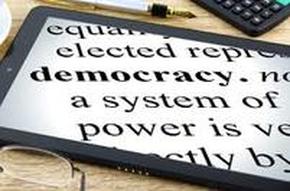A month after the UK voted to leave the EU in the June 2016 referendum.
I think I must be getting old: I suspect I’m about to sound like my grandfather, far less my dad. In the last few years there have been a number of elections and referendums held across the western world, none of which seem to follow a consistent line in what I understand by ‘democracy’.
The word is Greek, of course, and means ‘rule’(the –cracy bit) ‘by the people’ (the demos bit). That much is clear. Where the problems start is when the people don’t all agree. Western democracies from Aristotle onwards have settled on ‘the will of the many’, or ‘most’. Sometimes we talk about ‘majority rule’, but that isn’t right either – it’s been a long, long time since a government was elected by more than half of those who voted, far less those entitled to vote. What we really mean is ‘plurality rule’ – the most popular party, or perhaps simply the least unpopular. For the most part, election results leave an awful lot of people feeling robbed, cheated by the system. If the margin of victory is exceptionally small, that feeling will be intensified, as happened in the election George W. Bush over Al Gore in 2000.
Western democracies have tended to try to heal the wounds by seeking common ground between winners and losers. Losers urge their supporters to support winners. Winners speak of a need to heal society, as well they might: the success of democracy depends on losers not crying foul. Where the result is close, winners need to take notice and not immediately embark on radical programmes.
Worryingly, that’s not been happening lately. The recent Brexit result in the EU referendum was only clear insofar as it could not be contested, but 52% against 48% is absolutely not a mandate for radical constitutional change. What other organisation allows its constitution to be changed on a simple majority? Yet all we hear is that ‘Brexit means Brexit’, there’s no attempt to soften the line at all. My view is the Brexiteers know only too well that their position is weak, which is why they’re rushing so fast towards the cliff. And then there’s the little problem of Scotland.
Over in the US, Trump is creating a political climate where post-electoral unity will be utterly impossible. America is a divided enough country already without the irresponsible demagoguery of the New York businessman. People will vote for him in droves, he might even win, but if so Trump will have done so only on a relatively low turnout where hate is the principal driving agent.
In most countries in the world that would lead to civil war. One of the most worrying aspects of the 2014 Scottish independence referendum was the violent scenes during and particularly after the result was announced. The losers felt powerless, so they took to the streets. The western world needs to take a good hard look at itself and stop taking peaceful politics for granted, because once it’s gone, it becomes very hard to get it back again.
On the other hand, it could simply be that I’m getting old.
The word is Greek, of course, and means ‘rule’(the –cracy bit) ‘by the people’ (the demos bit). That much is clear. Where the problems start is when the people don’t all agree. Western democracies from Aristotle onwards have settled on ‘the will of the many’, or ‘most’. Sometimes we talk about ‘majority rule’, but that isn’t right either – it’s been a long, long time since a government was elected by more than half of those who voted, far less those entitled to vote. What we really mean is ‘plurality rule’ – the most popular party, or perhaps simply the least unpopular. For the most part, election results leave an awful lot of people feeling robbed, cheated by the system. If the margin of victory is exceptionally small, that feeling will be intensified, as happened in the election George W. Bush over Al Gore in 2000.
Western democracies have tended to try to heal the wounds by seeking common ground between winners and losers. Losers urge their supporters to support winners. Winners speak of a need to heal society, as well they might: the success of democracy depends on losers not crying foul. Where the result is close, winners need to take notice and not immediately embark on radical programmes.
Worryingly, that’s not been happening lately. The recent Brexit result in the EU referendum was only clear insofar as it could not be contested, but 52% against 48% is absolutely not a mandate for radical constitutional change. What other organisation allows its constitution to be changed on a simple majority? Yet all we hear is that ‘Brexit means Brexit’, there’s no attempt to soften the line at all. My view is the Brexiteers know only too well that their position is weak, which is why they’re rushing so fast towards the cliff. And then there’s the little problem of Scotland.
Over in the US, Trump is creating a political climate where post-electoral unity will be utterly impossible. America is a divided enough country already without the irresponsible demagoguery of the New York businessman. People will vote for him in droves, he might even win, but if so Trump will have done so only on a relatively low turnout where hate is the principal driving agent.
In most countries in the world that would lead to civil war. One of the most worrying aspects of the 2014 Scottish independence referendum was the violent scenes during and particularly after the result was announced. The losers felt powerless, so they took to the streets. The western world needs to take a good hard look at itself and stop taking peaceful politics for granted, because once it’s gone, it becomes very hard to get it back again.
On the other hand, it could simply be that I’m getting old.

